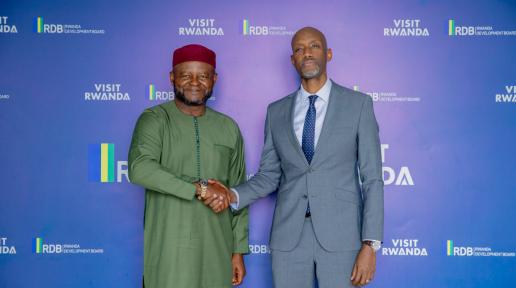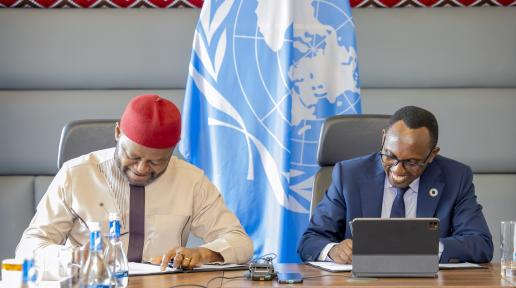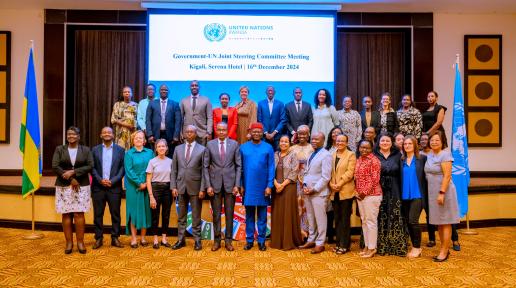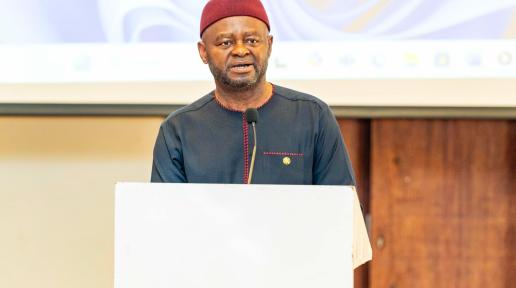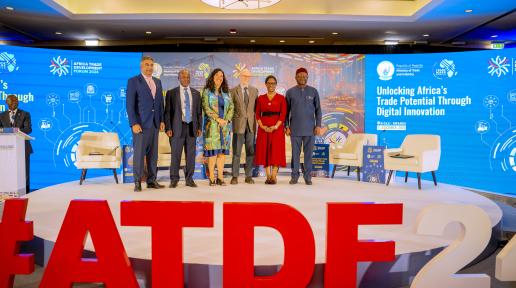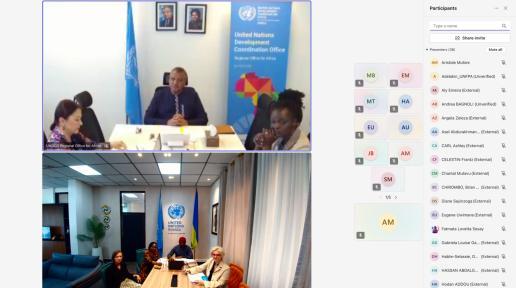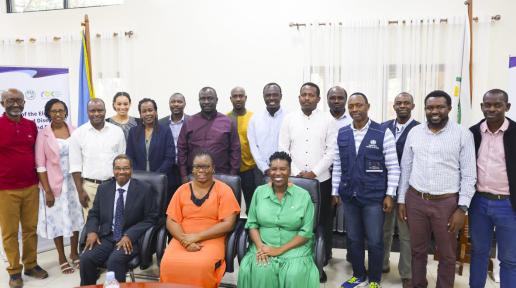Story
20 November 2025
UN Rwanda Unveils Five Flagship Investment Cases to Accelerate Rwanda’s Transformation Agenda
On 20th November 2025, the United Nations in Rwanda, convened development finance institutions, bilateral partners, the private sector, and philanthropic organisations for a High-Level Partner Roundtable showcasing five flagship Joint Programmes (JPs) designed as investment-ready propositions for Rwanda’s next generation of development solutions. The event marked a significant shift in how the UN Country Team operates under the new Cooperation Framework (2025–2029)—moving from fragmented projects to integrated, scalable, and co-financed initiatives aligned with Rwanda’s National Strategy for Transformation 2.Guided by the leadership of the UN Resident Coordinator, Dr. Ozonnia Ojielo, and the UNCT’s Programme Management Team, the five Joint Programmes were presented as bankable investment cases with clear financing pathways, measurable impact metrics, and strong national ownership. Stakeholders welcomed this new direction, commending the UN’s effort to move “from funding to financing development,” unlocking partnerships and capital flows needed to advance the achievement of the Sustainable Development Goals in Rwanda.“Rwanda aspires to be an upper-middle-income country by 2035 and a high-income economy by 2050. These ambitions require new, innovative ways of working, and given today’s complex development challenges, our collective offer as the United Nations is to help mobilise the right partnerships, capital, and capabilities to drive transformative impact through an innovative blended finance approach, said Ozonnia Ojielo, UN Resident Coordinator. The five new Joint Programmes presented today span Climate Action, Digitalisation, Health, Livestock Development, and Peace & Governance.Accelerating Climate Action and Clean Cooking (ACACIA)Co-led by WFP and UNEP, ACACIA offers a transformative pathway to reduce Rwanda’s heavy reliance on polluting cooking fuels while driving climate mitigation, health benefits, and economic opportunity. With 92% of households dependent on biomass and 7,400 annual premature deaths from household air pollution, ACACIA proposes a blended-finance architecture combining carbon revenues, risk-sharing instruments, and market development to unlock large-scale adoption of clean cooking. Its investment case positions Rwanda as a continental leader in climate-resilient, low-emission household energy systems.Digitalisation, Data and Innovation for Inclusive DevelopmentCo-led by UNDP and ITU, this JP aims to revolutionise Rwanda’s agriculture sector using digital platforms, data systems, and innovation. With agriculture employing 70% of the population, the programme will connect 1.5 million farmers, digitise 500 cooperatives, and deploy 100 solar-powered digital hubs offering market information, cold storage, processing tools, and fintech-enabled financial inclusion. Through a phased approach, it blends grants, PPPs, and impact investment to strengthen value chains, cut post-harvest losses by 30%, and create 5,000 agri-tech jobs—ensuring no farmer is left behind in the digital era.Integrated, Quality and People-Centred Primary Health CareCo-led by UNICEF and UNFPA, this programme aims to upgrade 420 health posts by 2029, addressing gaps in energy, digital connectivity, equipment, and service quality. Through climate financing, development impact bonds, and de-risked investment instruments, the JP seeks to equip, electrify, and digitise health posts—facilitating improved service delivery, reducing operational vulnerabilities, and strengthening Rwanda’s primary health care backbone. Its impact includes 84,000 tons of CO₂ avoided and enhanced access to quality care for millions.Livestock Value Chain Development for Economic Transformation (LVC-DET)Co-led by UNDP and FAO, this JP targets the modernisation of Rwanda’s pig and poultry value chains—areas with strong domestic demand but limited productivity. By expanding infrastructure, lowering feed costs through innovation, and deploying blended finance for SMEs, the programme aims to support 8,000 women and youth-led enterprises, create over 1,000 jobs, and boost productivity by up to 30%. With an expected IRR of 15–18%, LVC-DET positions livestock as a competitive engine for nutrition, exports, and inclusive rural growth.PEARL – Peace, Equity, Accountability, Resilience, and LeadershipCo-led by UNDP and IOM, the Joint Programme is anchored in good governance and stability. PEARL focuses on strengthening peace, security, civic engagement, and digital governance. It responds to challenges such as regional instability, rising cybercrime, limited civic participation, and digital exclusion. Through AI-enabled early warning systems, citizen-driven digital platforms, anti–hate speech mechanisms, and cross-border peacebuilding initiatives, the programme seeks to promote national unity and trust in public institutions. With a total cost of USD 15 million and an anticipated ROI of USD 60 million, PEARL positions governance as the foundation for socioeconomic transformation.“These Programmes are truly fascinating. Deep appreciation to the UN team for putting all of this together. By exploring partnerships and bringing our efforts together, we can effectively support Rwanda’s development priorities,” said Martina Fors Mohlin, Head of Development Cooperation and Deputy Head of Mission at the Swedish Embassy in Rwanda.A New Era of Partnerships and Financing for Development“We are in the business of advancing the Sustainable Development Goals — together. Among the more than 8 million Rwandans we connect through our telecommunications services are farmers, traders, women, and men who stand to benefit directly from the programmes you have presented. We bring practical solutions to the table, and by working in partnership, we can unlock even greater impact for the people we serve. The challenges that exist are not barriers; they are opportunities we can jointly address as policy influencers,” said Somdev Sen, Chief Consumer and Digital Officer.“At I&M Bank, Corporate Social Investment is a top priority. We are already partnering with the United Nations across key sectors such as health and agriculture, and all the Joint Programmes presented today are strong and compelling. What is needed now is action. We should not wait — even small, incremental steps will move us toward meaningful impact. I particularly appreciate that these initiatives have been framed as investment cases, with clear returns on investment,” said Henry Chinedu Obike, Chief Innovation Officer at I&M Bank Rwanda Plc.“One year in Rwanda, and we have already witnessed the country’s visionary leadership, which is truly remarkable. With the UN’s shift from funding to financing development, we have a unique opportunity to make all national priorities achievable. This event was both highly important and insightful,” said Bob Junker, Head of Cooperation at the Embassy of Luxembourg in Kigali.From Member States and Cooperation Partners to Private Sector leaders, the High-Level Partner Roundtable demonstrated a shared commitment to doing things differently: collaborating more closely, breaking down silos, and navigating the rapidly evolving landscape of development finance with innovation.The dialogue was rich, forward-looking, and anchored in a collective ambition. Partners voiced strong alignment with the UN’s integrated approach and a readiness to co-invest in Rwanda’s transformation priorities. This marks a pivotal milestone in repositioning the UN as a strategic broker—mobilising capital, forging partnerships, and driving systemic solutions rather than implementing isolated initiatives.As Rwanda advances toward Vision 2050, the five flagship Joint Programmes showcase how innovative financing, digital transformation, climate action, peacebuilding, and robust governance can converge to deliver high-impact and sustainable development outcomes.By working together as One UN, we can leverage our collective strengths to advance sustainable development financing and deliver meaningful results. Our shared efforts are contributing to shape a more inclusive and resilient future for Rwanda—ensuring that progress reaches everyone and that no one is left behind.”



